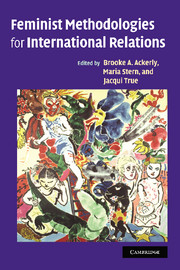Book contents
- Frontmatter
- Contents
- Notes on the contributors
- Acknowledgments
- 1 Feminist methodologies for International Relations
- Part I Methodological conversations between feminist and non-feminist IR
- Part II Methods for feminist International Relations
- 5 Motives and methods: using multi-sited ethnography to study US national security discourses
- 6 Methods for studying silences: gender analysis in institutions of hegemonic masculinity
- 7 Marginalized identity: new frontiers of research for IR?
- 8 From the trenches: dilemmas of feminist IR fieldwork
- 9 Racism, sexism, classism, and much more: reading security-identity in marginalized sites
- Part III Methodologies for feminist International Relations
- Conclusion
- Bibliography
- Index
7 - Marginalized identity: new frontiers of research for IR?
Published online by Cambridge University Press: 12 January 2010
- Frontmatter
- Contents
- Notes on the contributors
- Acknowledgments
- 1 Feminist methodologies for International Relations
- Part I Methodological conversations between feminist and non-feminist IR
- Part II Methods for feminist International Relations
- 5 Motives and methods: using multi-sited ethnography to study US national security discourses
- 6 Methods for studying silences: gender analysis in institutions of hegemonic masculinity
- 7 Marginalized identity: new frontiers of research for IR?
- 8 From the trenches: dilemmas of feminist IR fieldwork
- 9 Racism, sexism, classism, and much more: reading security-identity in marginalized sites
- Part III Methodologies for feminist International Relations
- Conclusion
- Bibliography
- Index
Summary
This chapter explores the methodological implications of putting otherwise marginalized research subjects at the center of IR inquiry. Centering the marginalized subject – namely the survivors of gender-based violence during and after the Independence War of Bangladesh – requires asking ethical and substantive questions that impact not only the research design but, more fundamentally, the research question itself. I began my methodological journey by asking questions about a gendered silence – the rape of of women during this war – and ended up exploring the story of nation-building. The subjects of my study were written out of that history, but that history was drafted on and with their bodies and families. Placing their stories as the focal point of my study, I demonstrate that centering the marginalized yields otherwise inaccessible theoretical insights to the question of nation-building, a central theme in mainstream IR.
IR, with its primary interest in state power, is now increasingly paying attention to normative frameworks of analysis. In addition, violence in Rwanda, Bosnia, Kosovo, and Haiti demonstrated that an unresolved past has the power to ferociously destabilize the present. A new generation of IR scholars is gradually daring to pursue unconventional projects that bring in people's voices and deploy them within the boundaries of the discipline. This is what feminist IR scholars, working on areas that have been traditionally overlooked by IR, such as gender, race, and class, have been doing for years.
- Type
- Chapter
- Information
- Feminist Methodologies for International Relations , pp. 129 - 152Publisher: Cambridge University PressPrint publication year: 2006
- 37
- Cited by



